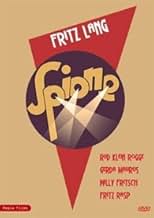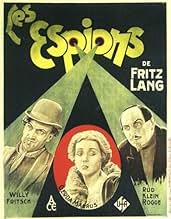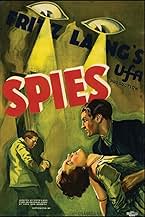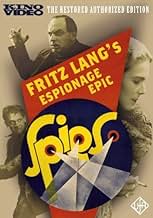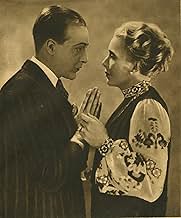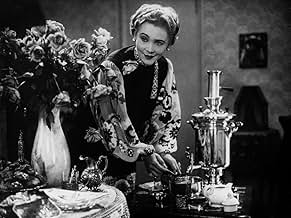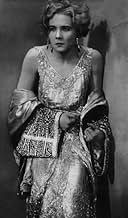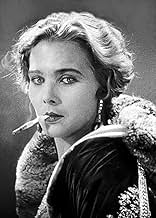AVALIAÇÃO DA IMDb
7,5/10
4,2 mil
SUA AVALIAÇÃO
O cérebro por detrás de uma operação de espionagem omnipresente descobre um romance perigoso entre uma rapariga russa ao seu serviço e um agente ousado do serviço secreto do governo.O cérebro por detrás de uma operação de espionagem omnipresente descobre um romance perigoso entre uma rapariga russa ao seu serviço e um agente ousado do serviço secreto do governo.O cérebro por detrás de uma operação de espionagem omnipresente descobre um romance perigoso entre uma rapariga russa ao seu serviço e um agente ousado do serviço secreto do governo.
- Direção
- Roteiristas
- Artistas
- Prêmios
- 1 indicação no total
Grete Berger
- Unconfirmed Role
- (não creditado)
Julius Falkenstein
- Hotel Manager
- (não creditado)
Heinrich Gotho
- Burton Jason's Other Assistant
- (não creditado)
Heinrich Gretler
- Spy in the Post Office scene
- (não creditado)
Gustl Gstettenbaur
- Boy Who Helps No. 326
- (não creditado)
Georg John
- Locomotive Engineer
- (não creditado)
Theodor Loos
- Handelsminister
- (não creditado)
Klaus Pohl
- Burton Jason's Assistant
- (não creditado)
Avaliações em destaque
The powerful criminal and leader of a spy ring Haghi (Rudolf Klein- Rogge) uses his spies that are infiltrated everywhere including in the secret service in attempts to steal documents from the French Embassy in Shanghai and from the Minister of Trade that is murdered. The press questions and mocks the officials in charge of security of state and the efficient Agent No. 326 a.k.a. the vagrant Hans Pockzerwinski (Willy Fritsch) is summoned by the Secret Service Chief (Craighall Sherry) to investigate the wave of crimes. Agent 326 immediately identifies that his chief's assistant Vincent is a spy that is providing inside information to the evil mastermind that no one knows how looks like. Meanwhile, Haghi saves the scoundrel Hans Morrier (Louis Ralph) from the gallows to serve him. Then Haghi, who is also the general director of the Haghi Bank, blackmails Mrs. Leslane (Hertha von Walther), who is the wife of the powerful Roger Lesland and habitué of an opium den, to get information of the Japanese Secret Treaty. When Haghi assigns his master spy Sonya Baranilkowa (Gerda Maurus) to get closer to the elegant Agent No. 326, they unexpectedly fall in love for each other affecting Haghi's evil scheme. Meanwhile his spy Kitty (Lien Deyers) lures and seduces the reserved and efficient Japanese agent Akira Matsumoto (Lupu Pick) to steal his documents about the recently signed Treaty that may bring war to the world.
"Spies" is a fantastic epic of espionage, romance, seduction and betrayal by Fritz Lang and I dare to say that James Bond stories might have been inspired in this film. I saw "Spies" yesterday in a restored authorized edition of the DVD released by Kino Video, and in the Extras there is the amazing story of the restoration of this film. The 35 mm archives in nitrate throughout the world were very damaged and incomplete, but this complex version was assembled from several copies using the guidance of the copy from Prague that was the most complete and also deteriorated. The result is a film of 143 minutes running time meaning 50 minutes longer than any version previously released. My vote is eight.
Title (Brazil): "Os Espiões" ("The Spies")
"Spies" is a fantastic epic of espionage, romance, seduction and betrayal by Fritz Lang and I dare to say that James Bond stories might have been inspired in this film. I saw "Spies" yesterday in a restored authorized edition of the DVD released by Kino Video, and in the Extras there is the amazing story of the restoration of this film. The 35 mm archives in nitrate throughout the world were very damaged and incomplete, but this complex version was assembled from several copies using the guidance of the copy from Prague that was the most complete and also deteriorated. The result is a film of 143 minutes running time meaning 50 minutes longer than any version previously released. My vote is eight.
Title (Brazil): "Os Espiões" ("The Spies")
In the space of the first one minute and 37 seconds, a safe is burgled, a diplomat is killed, two secret documents are stolen, and an intertitle demands "WHO IS BEHIND THIS?" We're off in the world of Fritz Lang's "Spies"
This film has everything that would later become spy film cliches: the ultra cool, ultra suave secret agent; the evil powerful genius, confined to a wheelchair, who dreams of world domination; his beautiful seductress, who falls for the secret agent. There are hidden microphones and disappearing ink and secret packages and bulletproof wallets. There's a motorcycle/car chase, and an in-tunnel train wreck to round out the action.
This film has everything that would later become spy film cliches: the ultra cool, ultra suave secret agent; the evil powerful genius, confined to a wheelchair, who dreams of world domination; his beautiful seductress, who falls for the secret agent. There are hidden microphones and disappearing ink and secret packages and bulletproof wallets. There's a motorcycle/car chase, and an in-tunnel train wreck to round out the action.
Fritz Lang was one of the great silent film directors (His talkies are great as well) and this is his best silent film. Agents target the mysterious Haghi (Rudolf Klien-Rogge), a master criminal out to topple the banks of the world. The pursuit includes a seductive young female spy driving a Japanese business man to hari-kiri, assassinations, a chase and a showdown on a train (that collides in one heck of a sequence.) The film concludes with Haghi trapped on a stage where he is dressed as a clown (Why a powerful bank president moonlights as a third rate clown has always puzzled me.) Alfred Hitchcock openly cites this brillaint film as an influence. Also, there is a priceless glimpse of 1920's Germany here- the decadence of Berlin, where apartment dwellers turn their tiny flats into bars for extra cash. Even when the film plays in its complete 3 hour form, it's an exciting time at the movies.
"Spies" is much more entertaining than you would expect an old German silent movie to be, and at first, it's hard to say why. The character types are familiar from hundreds of other spy movies: a villain who is bent on world domination and has multiple secret identities, a beautiful blonde who works as a spy for the villain, a dashing enemy agent who falls in love with the female spy. The plot is fairly ludicrous, though it moves along briskly and provides for some great set-pieces, such as an exhilarating chase scene. But despite all the clichés found in "Spies," the movie still feels fresh and vital. You get drawn into the world of the film and accept the clichés, rather than becoming distracted by them.
I'm sure most of the credit for this has to go to the director, Fritz Lang. His films ("Metropolis," "M") often have a very dark world view, but the overall tone of "Spies" is escapist adventure-fantasy. It aims to provoke thrills, not shock or outrage. Lang creates some stunning visual compositions and proves to be a very detail-oriented directorhe delights in close-ups of spy gadgetry! His innovative use of montages, dramatic lighting, camera movement, and other techniques gives the film an interesting stylization.
I'm writing this review after watching the 90-minute American version of "Spies". But I had such a good time that I may have to seek out the 146-minute version!
I'm sure most of the credit for this has to go to the director, Fritz Lang. His films ("Metropolis," "M") often have a very dark world view, but the overall tone of "Spies" is escapist adventure-fantasy. It aims to provoke thrills, not shock or outrage. Lang creates some stunning visual compositions and proves to be a very detail-oriented directorhe delights in close-ups of spy gadgetry! His innovative use of montages, dramatic lighting, camera movement, and other techniques gives the film an interesting stylization.
I'm writing this review after watching the 90-minute American version of "Spies". But I had such a good time that I may have to seek out the 146-minute version!
One of things that I think attracts young film fans to German cinema from the Weimar period is that it displays a striking stylistic extremism that captivates modern viewers not yet used to silent cinema. This ranges from Murnau's technical effects extravaganzas, to Lubitsch's off-the-wall comedy creations and, of course, Fritz Lang's angular architecture and comic-book sense of adventure.
A mistaken impression with these pictures is that they got to be so stylised because of a higher degree of artistic freedom in the European studios. However UFA studios were just as much about collaboration and commercialism as those in Hollywood. While individual directors did have a lot of control over the look of their pictures, these overt styles owe more to the influence of German theatre, as well as German literature, painting and the opera.
As with any cinema, anywhere, one of the most important collaborators is the screenwriter. No matter how strong or attention-grabbing your visual style is, if you haven't got the story, you haven't got anything. Spione features one of the best efforts from Lang's collaborator and wife Thea von Harbou, and is in many ways a tightened-up reworking of Dr Mabuse. Whereas that earlier picture was full of unnecessarily long title cards, Spione is far more succinct, allowing the audience to fill in the gaps. Importantly it begins with a lengthy piece of pure silent storytelling, which helps to engage us before bombarding us with verbal information. Harbou's characters are also very strong. It's a nice touch to make arch-villain Haghi wheelchair bound – a man who is weak in body but strong in means and influence.
Lang himself was by now a master of his own highly individual technique. Space and set décor should be important to every director, but Lang is probably the only one who tells his stories more through architecture than through actors. With rooms so bizarre and angular they would probably drive most people mad if they had to live or work in them, Lang sets a tone for each location, and thus for each scene. Narrow corridors give a sense of entrapment; open doorways leading onto larger spaces give a sense of uneasiness; crisscrossing diagonals carve up the screen, often drawing our attention to things and people. One thing that especially stands out in Spione is that way Lang often creates compositions that are almost-but-not-quite symmetrical. Just as a great colour director like Vincente Minnelli might throw in a splash of blue to offset (and thus bring to life) a shot full of shades of red, Lang adds for example the nurse standing to one side of an otherwise symmetrical shot of Haghi sat at his desk.
Even Lang's choice of camera position was strictly angular. He is either to one side, detached from the action, or he is right inside it with actors staring straight into the lens. He rarely uses, say, opposing over-the-shoulder shots that many directors would for intimate dialogue scenes, but his methods were nonetheless effective. Spione in fact features one of his most beautifully constructed romantic scenes in the first meeting between Willy Fritsch and Gerda Maurus. Lang begins with the camera to one side, simply filming the meeting as a casual observer. He then begins placing the camera between them, interspersed with close-ups of hands or other objects, making us experience the growing emotional intensity as well as that slight feeling of awkwardness. We then return to a shot to the side of the actors, but closer this time, as they move in for their first kiss. In spite of his reputation Lang could be incredibly tender and sentimental at times.
Exaggerated acting tends to be part and parcel of that over-the-top nature of German silent cinema, and in the case of Lang's features it is often particularly apt given the comic-book style characters and situations. Spione is no exception, but it is nice to see the normally animated Rudolf Klein-Rogge getting to underplay it a little as a cool and collected villain. Lupu Pick also gives a very deep and emotionally complex performance as the Japanese ambassador.
The upshot of this collaboration is an incredibly exciting and satisfying picture, even though it is rarely referenced as one of Fritz Lang's best. If it is remembered at all it is usually for its resemblance to later gadget-based espionage thrillers, as well as containing many of the suspense building techniques later employed by Hitchcock, such as letting the audience in on things the characters do not know. It is, nevertheless, among the most carefully constructed, exciting and purely enjoyable of Lang's silent pictures, and an improvement on the better-known Dr Mabuse.
A mistaken impression with these pictures is that they got to be so stylised because of a higher degree of artistic freedom in the European studios. However UFA studios were just as much about collaboration and commercialism as those in Hollywood. While individual directors did have a lot of control over the look of their pictures, these overt styles owe more to the influence of German theatre, as well as German literature, painting and the opera.
As with any cinema, anywhere, one of the most important collaborators is the screenwriter. No matter how strong or attention-grabbing your visual style is, if you haven't got the story, you haven't got anything. Spione features one of the best efforts from Lang's collaborator and wife Thea von Harbou, and is in many ways a tightened-up reworking of Dr Mabuse. Whereas that earlier picture was full of unnecessarily long title cards, Spione is far more succinct, allowing the audience to fill in the gaps. Importantly it begins with a lengthy piece of pure silent storytelling, which helps to engage us before bombarding us with verbal information. Harbou's characters are also very strong. It's a nice touch to make arch-villain Haghi wheelchair bound – a man who is weak in body but strong in means and influence.
Lang himself was by now a master of his own highly individual technique. Space and set décor should be important to every director, but Lang is probably the only one who tells his stories more through architecture than through actors. With rooms so bizarre and angular they would probably drive most people mad if they had to live or work in them, Lang sets a tone for each location, and thus for each scene. Narrow corridors give a sense of entrapment; open doorways leading onto larger spaces give a sense of uneasiness; crisscrossing diagonals carve up the screen, often drawing our attention to things and people. One thing that especially stands out in Spione is that way Lang often creates compositions that are almost-but-not-quite symmetrical. Just as a great colour director like Vincente Minnelli might throw in a splash of blue to offset (and thus bring to life) a shot full of shades of red, Lang adds for example the nurse standing to one side of an otherwise symmetrical shot of Haghi sat at his desk.
Even Lang's choice of camera position was strictly angular. He is either to one side, detached from the action, or he is right inside it with actors staring straight into the lens. He rarely uses, say, opposing over-the-shoulder shots that many directors would for intimate dialogue scenes, but his methods were nonetheless effective. Spione in fact features one of his most beautifully constructed romantic scenes in the first meeting between Willy Fritsch and Gerda Maurus. Lang begins with the camera to one side, simply filming the meeting as a casual observer. He then begins placing the camera between them, interspersed with close-ups of hands or other objects, making us experience the growing emotional intensity as well as that slight feeling of awkwardness. We then return to a shot to the side of the actors, but closer this time, as they move in for their first kiss. In spite of his reputation Lang could be incredibly tender and sentimental at times.
Exaggerated acting tends to be part and parcel of that over-the-top nature of German silent cinema, and in the case of Lang's features it is often particularly apt given the comic-book style characters and situations. Spione is no exception, but it is nice to see the normally animated Rudolf Klein-Rogge getting to underplay it a little as a cool and collected villain. Lupu Pick also gives a very deep and emotionally complex performance as the Japanese ambassador.
The upshot of this collaboration is an incredibly exciting and satisfying picture, even though it is rarely referenced as one of Fritz Lang's best. If it is remembered at all it is usually for its resemblance to later gadget-based espionage thrillers, as well as containing many of the suspense building techniques later employed by Hitchcock, such as letting the audience in on things the characters do not know. It is, nevertheless, among the most carefully constructed, exciting and purely enjoyable of Lang's silent pictures, and an improvement on the better-known Dr Mabuse.
Você sabia?
- CuriosidadesUFA insisted on the film being made inexpensively, as Fritz Lang's previous film Metrópolis (1927) had brought the studio to near bankruptcy. Lang therefore chose to do most of the shots in narrow settings with lots of close-ups, as no big sets had to be built up for that way of filming. Fortunately "Spione" became a huge success.
- Erros de gravaçãoWhen Sonya and Franz (the chauffeur) are tied up and trying to escape, the hand cranking the camera is visible.
- ConexõesEdited into Fritz Lang, le cercle du destin - Les films allemands (2001)
Principais escolhas
Faça login para avaliar e ver a lista de recomendações personalizadas
- How long is Spies?Fornecido pela Alexa
Detalhes
- Tempo de duração
- 2 h 30 min(150 min)
- Cor
- Mixagem de som
- Proporção
- 1.33 : 1
Contribua para esta página
Sugerir uma alteração ou adicionar conteúdo ausente


